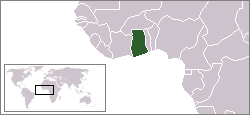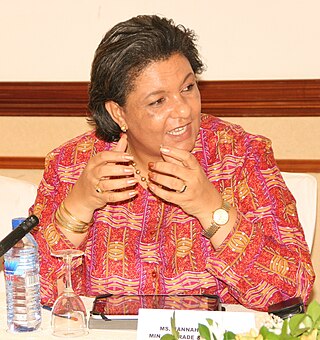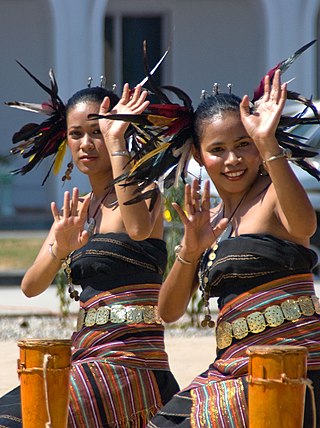
Politics of Ghana takes place in a framework of a presidential representative democratic republic, whereby the president of Ghana is both head of state and head of government, and of a two party system. The seat of government is at Golden Jubilee House. Executive power is exercised by the government. Legislative power is vested in both the government and Parliament. The judiciary is independent of the executive and the legislature.
Gender equality, also known as sexual equality or equality of the sexes, is the state of equal ease of access to resources and opportunities regardless of gender, including economic participation and decision-making; and the state of valuing different behaviors, aspirations and needs equally, regardless of gender.

Lesbian, gay, bisexual, and transgender (LGBT) persons in Ghana face legal and societal challenges and discrimination not experienced by non-LGBT citizens.

The Ghana Broadcasting Corporation (GBC) was established by law in 1968 with a triple mandate as a State Broadcaster, Public Service Broadcaster, and a Commercial Broadcaster in Ghana. Headquartered in the capital city, Accra, it is funded by grants, broadcasting television commercials and the levying of a television licence, costing 36 cedis and 60 cedis for one or more TV sets in the same house every year. TV set repairers and sales outlets are to pay an annual sum of between 60 cedis to 240 cedis.
Domestic violence is a severe issue in Russia. According to Human Rights Watch, citing RIA Novosti, as many as 36,000 women and 26,000 children faced daily abuse at home in 2013. According to official MVD data, in 2015 around 1060 people died of domestic violence in Russia. Of them, 756 were men and 304 women. According to an independent study of 2,200 women in fifty cities and towns in Russia, 70% have experienced at least one form of gender-based violence in the home—physical, psychological, economic, or sexual.
Prostitution in Ghana is illegal but widespread, so much so that many Ghanaians are unaware that it is prohibited. There are growing sex tourism, child prostitution and human trafficking. High rates of unemployment and poverty in Ghana are believed to be causing a drastic growth in the sex industry. Unemployment is a reason the teenage engage in sex trade. A high percentage of sex workers are vulnerable to HIV.

The status of women in Ghana and their roles in Ghanaian society has changed over the past few decades. There has been a slow increase in the political participation of Ghanaian women throughout history. Women are given equal rights under the Constitution of Ghana, yet disparities in education, employment, and health for women remain prevalent. Additionally, women have much less access to resources than men in Ghana do. Ghanaian women in rural and urban areas face slightly different challenges. Throughout Ghana, female-headed households are increasing.
This page examines the dynamics surrounding women in Tajikistan.

Domestic violence is violence or other abuse that occurs in a domestic setting, such as in a marriage or cohabitation. Domestic violence is often used as a synonym for intimate partner violence, which is committed by one of the people in an intimate relationship against the other person, and can take place in relationships or between former spouses or partners. In its broadest sense, domestic violence also involves violence against children, parents, or the elderly. It can assume multiple forms, including physical, verbal, emotional, economic, religious, reproductive, financial abuse, or sexual abuse. It can range from subtle, coercive forms to marital rape and other violent physical abuse, such as choking, beating, female genital mutilation, and acid throwing that may result in disfigurement or death, and includes the use of technology to harass, control, monitor, stalk or hack. Domestic murder includes stoning, bride burning, honor killing, and dowry death, which sometimes involves non-cohabitating family members. In 2015, the United Kingdom's Home Office widened the definition of domestic violence to include coercive control.
Domestic violence in Tajikistan is very high, due to traditional Tajik muslim family values, as well as a reluctance by the authorities to intervene in what is viewed in Tajikistan as a "private family matter".

The East Timorese people mixed racially with Melanesian and Malay genetically. Most of the East Timorese population are Roman Catholic.

Domestic violence in United States is a form of violence that occurs within a domestic relationship. Although domestic violence often occurs between partners in the context of an intimate relationship, it may also describe other household violence, such as violence against a child, by a child against a parent or violence between siblings in the same household. It is recognized as an important social problem by governmental and non-governmental agencies, and various Violence Against Women Acts have been passed by the US Congress in an attempt to stem this tide.
Domestic violence against men is violence or other physical abuse towards men in a domestic setting, such as in marriage or cohabitation. As with domestic violence against women, violence against men may constitute a crime, but laws vary between jurisdictions. Intimate partner violence (IPV) against men is generally less recognized by society than intimate partner violence against women, which can act as a further block to men reporting their situation.

Domestic violence in India includes any form of violence suffered by a person from a biological relative but typically is the violence suffered by a woman by male members of her family or relatives. Although Men also suffer Domestic violence, the law under IPC 498A specifically protects only women. Specifically only a woman can file a case of domestic violence. According to a National Family and Health Survey in 2005, total lifetime prevalence of domestic violence was 33.5% and 8.5% for sexual violence among women aged 15–49. A 2014 study in The Lancet reports that although the reported sexual violence rate in India is among the lowest in the world, the large population of India means that the violence affects 27.5 million women over their lifetimes. However, an opinion survey among experts carried out by the Thomson Reuters Foundation ranked India as the most dangerous country in the world for women.

The Ghanaian people are a nation originating in the Ghanaian Gold Coast. Ghanaians predominantly inhabit the Republic of Ghana and are the predominant cultural group and residents of Ghana, numbering 30 million people as of 2020, making up 85% of the population. The word "Ghana" means "warrior king". An estimated diaspora population of 4 million people worldwide are of Ghanaian descent. The term ethnic Ghanaian may also be used in some contexts to refer to a group of related ethnic groups native to the Gold Coast.
Domestic violence is prominent in Nigeria as in other parts of Africa. There is a deep cultural belief in Nigeria that it is socially acceptable to hit a woman as a disciplinary measure. Cases of Domestic violence are on the high and show no signs of reduction in Nigeria, regardless of age, tribe, religion, or even social status. The CLEEN Foundation reports 1 in every 3 respondents admitting to being a victim of domestic violence. The survey also found a nationwide increase in domestic violence in the past 3 years from 21% in 2011 to 30% in 2013. A CLEEN Foundation's 2012 National Crime and Safety Survey demonstrated that 31% of the national sample confessed to being victims of domestic violence.
Domestic violence in Uganda is a problem as it is in many parts of Africa.
Francisca Ashietey-Odunton is a Ghanaian journalist, broadcaster and diplomat. She was formerly the Acting Director-General of the Ghana Broadcasting Corporation and currently Ghana's high commissioner to Turkey (2020-date), haven served earlier on in Kenya (2017-2020).

Naana Otoo-Oyortey is an Ghanaian social activist, the executive director of the Foundation for Women's Health, Research and Development.

Crime in Ghana is investigated by the Ghana Police Service.











